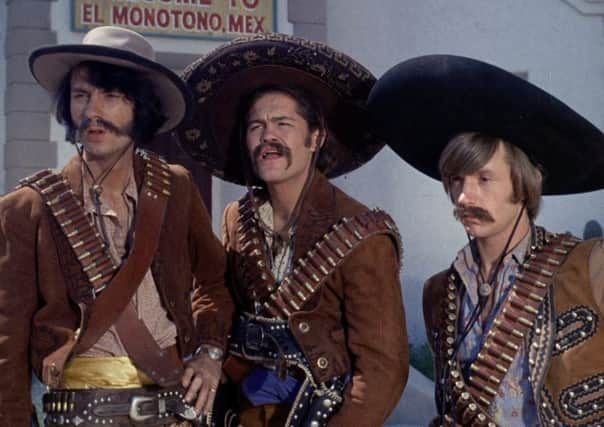Album reviews: The Monkees | Bob Dylan | Malcolm Middleton


In this 50th anniversary year of The Beach Boys’ groundbreaking Pet Sounds, the three surviving Monkees – Mike Nesmith, Mickey Dolenz and Peter Tork – remain stuck in their past, celebrating their own half-century as the original manufactured boy band with the wacky TV sitcom and a brace of great pop songs which have aged so well that the band have chosen to more or less recreate that self-styled “progressive bubblegum” sound on their first album of new material in 20 years.
Good Times! (***) harvests songs from a number of sources, ancient and modern. The title track by Harry Nilsson dates from 1960s recording sessions. It’s a groovy hand-jive, powered by a beat pop rhythm, and souped up with a newly recorded raucous turn by Dolenz in order to create a duet with Nilsson’s original guide vocal.
Advertisement
Hide AdAdvertisement
Hide AdDavy Jones’ distinctive pop voice is also disinterred from the vaults on a trademark Neil Diamond tune called Love to Love, while his erstwhile bandmates submit a couple of new originals. Peter Tork supplies the simple country ditty Little Girl, Nesmith the frail but affecting I Know What I Know.
In their time, The Monkees also dabbled successfully in alternative country and acid pop, and it seems they didn’t need to look too far for new songwriting collaborators in the old style to fill the rest of the album.
Psychedelia fans Noel Gallagher and Paul Weller have co-written them a mediocre Beatley pop trip called Birth of an Accidental Hipster, XTC’s Andy Partridge pens a suitably sunny 60s pop pastiche You Bring Me Summer, replete with twanging guitars, xylophone breaks and handclaps, and Weezer frontman Rivers Cuomo contributes the winsome She Makes Me Laugh. The jaunty, disposable Our Own World and chugging, charmless I Was There (And I’m Told I Had A Good Time) come courtesy of album producer Adam Schlesinger, while Ben Gibbard of Death Cab for Cutie plugs into their maudlin country streak with the engaging hangdog Me & Magdalena. The best moment by far though is their world-weary version of Carole King and Gerry Goffin’s Wasn’t Born to Follow.
Bob Dylan digs further back in time on Fallen Angels (***), another album of Sinatra-covered standards to follow Shadows In The Night – though Dylan prefers the term “uncover”. There is something of the retirement home to his creaky waltz Polka Dots and Moonbeams and the halting All The Way and his grizzly delivery transforms Young At Heart from carefree to careworn. Dylan may not swing exactly but he is unfailingly articulate and wise to the crumpled spirit of these songs in a way that, say, Rod Stewart failed to appreciate across his conservative Great American Songbook series. The arrangements here are soft and sensitive rather than brash big band, infused instead with a soupcon of western swing courtesy of delicately picked steel guitar.
Former Arab Strap man Malcolm Middleton appears to have surrendered to an electronica epiphany which began with his Human Don’t Be Angry instrumental alter ego and continues with his latest solo offering, made in collaboration with sparkling synth pop artist Miaoux Miaoux. Summer of ’13 (***) stops short of creating a hands-in-the-air loved-up club vibe – Middleton sounds like he might be getting there with the trancey intro to Big Black Hole, but the song itself is a mordant father-to-son missive.
Middleton is not generally the most melodic of singers but he steps up to the plate here on the blithe but suitably dreamy synthpop Lullaby and relinquishes his wallflower comfort zone to just about dance himself dizzy on You & I. Fiona Shepherd
CLASSICAL: Schubert: Symphony No 9 | Rating: **** | Signum Classics
Advertisement
Hide AdAdvertisement
Hide AdSchubert’s Ninth Symphony may be shrouded in mystery so far as the actual date of composition is concerned – was it, as dated, completed in the year of his death 1828, or a few years beforehand, as suggested in various correspondences? And it may have its structural weaknesses – what Schubert symphony hasn’t? But there is genius in its liquid melodic invention and its breezy but cultivated countenance which this Live in Concert recording by the Philharmonia Orchestra reflects rather satisfyingly under Christoph von Dohnányi.
It opens with a freshness and dignity, un-rushed but directional, from which delicious colours and nuances seamlessly emerge. The Andante adds mellifluous intimacy, the Scherzo a boisterous joy, and in the finale a resolute finesse epitomises the spritely, judicious precision of Dohnányi’s lively reading. Ken Walton
FOLK: Rant: Reverie | Rating: ***** | Make Believe Records
“Chamber folk” may serve as a term of convenience to describe this fiddle quartet of Shetland sisters Jenna and Bethany Reid and Highlanders Lauren MacColl and Sarah-Jane Summers, but it conveys nothing of the irresistible vivacity and classy execution of their music, both traditional and self-composed.
From the mercurial dash of the opening JT’s and on through such established material as the the Shetland reel Wha’ll Dance Wi Wattie? or the pipe tune Willie Cumming’s Rant, there’s no holding them. There’s a slightly nominal feel to Julie Fowlis’s puirt à beul and the other vocal contribution, Ewan McLennan’s nicely delivered arrangement of Mary’s Dream, in otherwise solidly instrumental company.
Regardless of the forcefulness implied in their name, Rant creates cadences of sublime stillness, as in Bethany Reid’s evocation of her family home, Rehoboth, and the harmonies of an Icelandic hymn. Jim Gilchrist